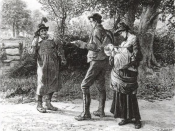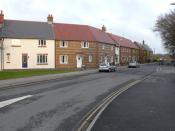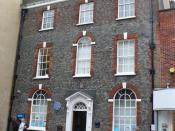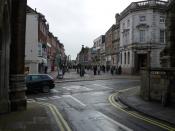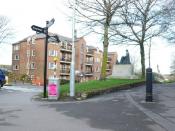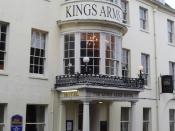As depicted in Thomas Hardy's The Mayor of Casterbridge, man's future lies in the hands of his past actions. The intelligent or ignorant decisions that man makes, places an immediate or long-term effect on the rest of man's life. Occurring in the rustic town of Casterbridge, Michael Henchard, whose interactions with the people of Casterbridge lead to his demise, is only one of the people who decide their own destiny through there actions. The decisions that the inhabitants of Casterbridge make affect the rest of their lives. The good and evil attributes which man possesses determine his fate.
The good qualities which man holds leads to future happiness. Initially, man's understanding nature results in a happy lifestyle. Farfrae, "determined to take him[Henchard] at his word," (105) illustrates his understanding demeanor by showing no signs of bitterness when Henchard fires him, thus Farfrae lives happily ever after with Elizabeth-Jane.
Refusing to chastise with Henchard for lying to him, Newson exhibits his worthy personality which gives Newson a prosperous life as the recognized father of Elizabeth-Jane. Appropriately, honesty provides for a life of pleasure. Allowing him to live a successful life, Newson admits his plan of letting everyone think that he was lost at sea. After Farfrae's dismissal, Farfrae remains loyal to Henchard in that he promises not to detract from Henchard's business which is inevitable; however, because of Farfrae's sincerity, Farfrae leads a successful life. Most significantly, man's intellect results in an enjoyable future. Assuring Newson a wonderful life and showing how much he cares for his child, Newson conjures a plan that if Susan "thinks me[Newson] dead she'll go back to him[Henchard], and the child will have a home" (285). Farfrae's superior reasoning skills and wit in his grain business and in his life deliver a most luxurious future. As the positive qualities of man determine man's destiny, the negative attributes of man also decide man's fate.
The evil characteristics of mankind insure a life of suffrage. Man's desire to seek vengeance causes his own demise. Jopp's willingness to force Farfrae out of business was so strong that Jopp "was as unsafe a colleague as Henchard could have chosen" (179). Henchard's own bitterness toward Farfrae for stealing Lucetta and initially causing Henchard to lose his business leads to Henchard challenging Farfrae in a dual to the death. Henchard wins the match, but spares Farfrae's life. This unruly behavior by Henchard and Jopp lead to both Jopp's unemployment and Henchard losing every aspect of his life which remains important. Undeniably, the deceitfulness of man results in serious consequences. Susan's lying to Henchard in the letter about Elizabeth-Jane not truly being Henchard's daughter leads to Susan's death. Moreover prolonging to the downfall of Henchard, is his not informing Elizabeth-Jane that he sold Susan at the fair many years ago. Undoubtedly, irresponsibility causes painful situations that man must deal with. Henchard's negligence to keep a close eye on his business results in the bankruptcy of the business. Lucetta's incompetence of writing the letters to Henchard instead of confronting him leads to her death.
Mankind's future remains decided by his actions in the past. Positive qualities of man such as honesty and wit allow man to live a prosperous life without encountering many obstacles. On the other hand, negative attributes of man like vengeance and deceitfulness cause the downfall of man. The fate of man remains an extremely powerful force that only man himself can control. Ultimately, man holds the power to control his own destiny through the implementation either good or evil qualities.
A Theme Analysis of The Mayor of Casterbridge Thesis: The good abd evil attributes which man possesses determine his fate.
I. Good attributes A. Understanding 1.
